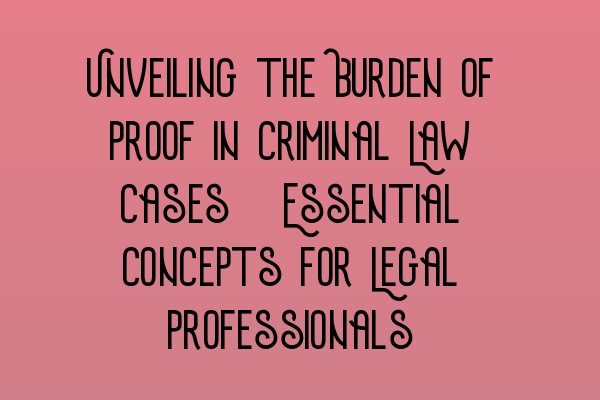Unveiling the Burden of Proof in Criminal Law Cases: Essential Concepts for Legal Professionals
As legal professionals, understanding the burden of proof in criminal law cases is crucial in ensuring justice prevails. The burden of proof refers to the obligation of the prosecution to prove the guilt of the accused beyond a reasonable doubt. In this article, we will explore the essential concepts related to the burden of proof and shed light on the various factors that legal professionals must consider while handling criminal law cases.
The Standard of Proof: Beyond a Reasonable Doubt
When it comes to criminal law cases, the standard of proof required is “beyond a reasonable doubt.” This means that the prosecution must present evidence to prove the accused’s guilt to such an extent that no reasonable person could have any doubt about their guilt. It is a high standard deliberately set to protect the rights of the accused and ensure a fair trial.
Therefore, as legal professionals, it is essential to understand the elements of a crime and the burden of proof required for each element. By deconstructing the crime into its essential elements and analyzing the evidence available, legal professionals can effectively build a strong case.
Key Elements of the Burden of Proof
When dealing with the burden of proof in criminal law cases, there are several key elements that legal professionals must consider:
- Evidence: The prosecution must present admissible evidence that proves the accused’s guilt beyond a reasonable doubt. This can include witness testimonies, physical evidence, expert analysis, and documentary evidence.
- Presumption of Innocence: Every accused person is presumed innocent until proven guilty. It is the prosecution’s responsibility to overcome this presumption by presenting sufficient evidence.
- Proof of Mens Rea: In many criminal offenses, the prosecution must also prove the accused’s intent or state of mind at the time of the alleged crime. This can be challenging, as it requires establishing the accused’s mental state beyond a reasonable doubt.
- Absence of Reasonable Doubt: The prosecution must eliminate any reasonable doubt that may arise from conflicting evidence or alternative explanations. If there is a reasonable doubt regarding the accused’s guilt, the burden of proof has not been met.
Legal professionals must meticulously analyze the evidence, carefully cross-examine witnesses, and challenge any inconsistencies or weaknesses in the prosecution’s case. By effectively discrediting the evidence presented, legal professionals can create doubt in the minds of the jurors or judges, effectively shifting the burden back to the prosecution.
Conclusion
The burden of proof in criminal law cases is a complex concept that requires legal professionals to carefully navigate the elements of a crime and present conclusive evidence beyond a reasonable doubt. Understanding the burden of proof is essential in ensuring a fair trial and protecting the rights of the accused. By utilizing the knowledge and strategies discussed in this article, legal professionals can enhance their skills in handling criminal law cases and contribute to the administration of justice.
For more information on related topics, please visit the following articles:
- SQE Exam Prep: Essential Study Materials for Aspiring Solicitors
- Demystifying the Solicitors Qualifying Examination Format
- SQE Exam for International Lawyers: Challenges and Success Strategies
- LLC Formation Made Simple: Step-by-Step Guide for UK Entrepreneurs
- LLC Formation: A Step-by-Step Guide for UK Entrepreneurs
